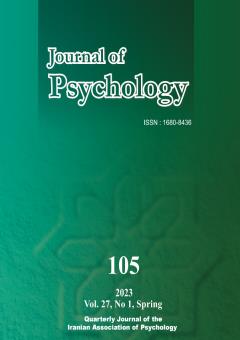Explaining the prediction model of students' marital conflicts based on basic needs
Subject Areas : روانشناسیKobra Ghasemi moghaddam 1 , Abdollah Shafiabady 2 * , Asghar Sharifi 3
1 - Department of Counseling, Roodehen Branch, Islamic Azad University, Tehran, Iran.
2 -
3 - Department of Counseling, Roodehen Branch, Islamic Azad University, Tehran, Iran.
Keywords: Marital conflicts, Glaser's basic needs, students,
Abstract :
The aim of this study was to explain the model of predicting marital conflicts of students based on basic needs. This study is of descriptive method and the design is correlational based on structural equation modeling. The statistical population included all married students of 4 Azad University of Tehran in 2018. A sample of 172 students of Islamic Azad University (131 females, 41 males) were selected by cluster sampling method and within each cluster through purposive sampling method. Data were collected using marital conflict questionnaire (MCQ) and Glaser's basic needs questionnaire (GBNQ) and analyzed using spss-22 software. The findings indicated that there is a significant positive relationship between the levels of satisfaction of basic needs. The correlation between marital conflicts with the need for love and belonging and the need to pleasure is also negative and significant. The correlation between the five basic needs is positive and significant; therefore, marital conflicts can be predicted using basic needs.
براتی، طاهره. (1375). تأثیر تعارضات زناشویی بر روابط متقابل زن و شوهر. کارشناسی ارشد، دانشگاه آزاد اسلامی واحد رودهن.
پروچاسکا, جیمز، نورکراس جان. (1999). نظریههای روان درمانی. مترجم سیدمحمدی، یحیی. (1395) چاپ 11. تهران: نشر روان.
پژوهشینیا، خدیجه، گلستانیان آزیتا. (1396). بررسی اثربخشی واقعیت درمانی بر ارتقا روابط زناشویی زوجین. فصلنامه مطالعات روانشناسی و علوم تربیتی.
پهلوان، مینا، موتابی فرشته، مظاهری، محمدعلی. (1394). واکنش به تعارض زناشويي: مطالعه اي بين نسلي. مجله روانپزشکی و روانشناسی بالینی ایران (اندیشه و رفتار)، 21(3).
شفیع آبادی، عبدالله، ناصری، غلامرضا. (1396). نظریههای مشاوره و روان درمانی. تهران: مرکز نشر دانشگاهی.
گلاسر، ویلیام (1998). تئوری انتخاب. ترجمه نورالدین رحمانیان. (1385). تهران: انتشارات آشتیان.
هفت لنگ، فاطمه، ابراهیمی، محمد اسماعیل، زمانی، نرگس، صاحبی، علی. (1398). رابطه شدت نیازهای اساسی در نظریه گلاسر با رضایت از زوجیت، سلامت روان و بهزیستی روانی دانشجویان متاهل . فصلنامه فرهنگی- تربیتی زنان و خانواده، (48)14، 38-23.
هوشمندی، رودابه، احمدی، خدابخش، کیامنش، علیرضا. (۱۳۹۸). تحلیلی بر علل تعارضات زناشویی در دو دهه اخیر (یک مرور نظامند) . مجله علمی-پژوهشی علوم روانشناختی. دوره ۱۸، شماره ۷۹ .
وزیری، مژده. (1394 ). پیشبینی رضایت زناشویی زوجها براساسی آنها. رویش روانشناسی، سال 3 ، شماره 4 .صص 96-87.
American Psychological Association, A. (2018). APA Dictionary of Psychology. American Psychological Association.
Glasser, W. (2000). Counseling with choice theory: The new Reality Therapy; New York, Harper Collins Publisher.
Brown, T. Stuart, S. (2012). Identifying basic needs: the contextual need assessment. Int J Real Ther. 24, 2, pp 7-10.
Barati, T. Sanai, B. (1996). Inventory marital conflict. Measures of family structure and marriage. Tehran: The Institute's Bethat Publications, pp 53-48.
Zeidner M, Kloda I. (2014) Emotional intelligence (EI), conflict resolution patterns and relationships satisfaction, actor and partner effect revisited. Pers Individ Diff. 54: 278- 283.
Brown T, Stuart S. (2012). Identifying basic needs: the contextual need assessment. Int J Real Ther. 24(2):7-10.
Sanger, F. (2016). Psychological needs satisfaction and marital satisfaction. Journal of international scholars conference. 1(2). 90-95.
Soltanifar, Atefeh; Adinehpour, Moosalreza; Borhani, Mahdieh; & Ziaee, maliheh. (2018). The relationship between satisfying the needs (based on the choice theory), quality of life and marital satisfaction among addict individuals who undergone treatment. Fundamentals of Mental Health. 20(4): 271-277.
Sharf, Richard S. (2015). Theories of Psychotherapy & Counseling: Concepts and Cases (6th Edition) (2015-01-16).

